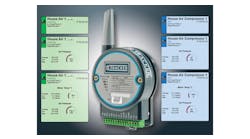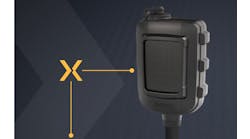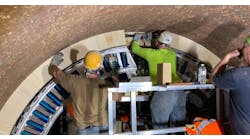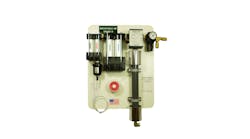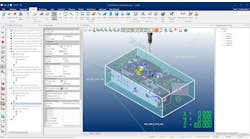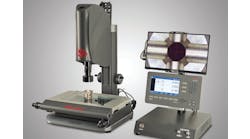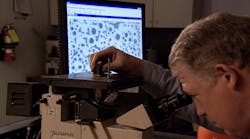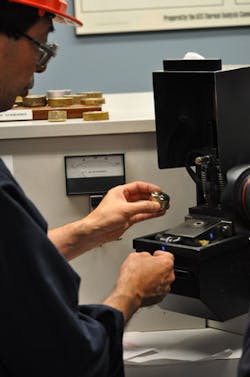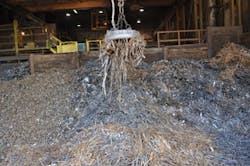Developing a best-in-class quality-control program demands a thorough understanding of processes, both in the methods and practices set by an operation’s managers and in the minds of the metalcasting workers. To obtain the highest levels of quality control, it is important for modern foundries to be as well-organized as possible, and developing a complete quality-control plan is the bedrock of any such endeavor.
Regular testing remains the cornerstone of any thorough quality-control process, but this cannot be a random practice, nor one that is focused simply on products exiting a production line. A company’s quality-control plan should explain exactly each step involved in the process, and the frequency with which it should take place, and define acceptable ranges of results. It also should set out the appropriate steps to be taken when a problem is identified.
Supply Chain Review — Any customer (or potential customer) visiting a foundry should ask to see the quality-control plan as part of a supplier audit, and reviewing this will provide an excellent initial indicator of whether a foundry has its quality processes organized or not.
Building on extensive work with clients in the automotive industry, Victaulic has developed a detailed control plan with more than 100 steps, ranging from ensuring ASTM specifications are properly met and microstructure testing is completed, through to nodularity in the cast material and process checks. With a single chief metallurgist across the global organization, the same control book is in use at each locations.
This well-defined plan builds on the 2,000-plus annual audits the company undergoes every year, and explains exactly what should take place in every step of production, from start to finish. Vetting incoming raw materials and ensuring vendors meet the highest standards is the first crucial step in the physical production process.
It is important that only the best ingredients reach the melt, as impurities may create blowholes and porosity in metal. Products designed for a specific tensile strength may become too brittle or too elastic, causing elongation and giving rise to a risk of fracture. Good quality scrap leads to a much better pour and higher quality results with better consistency.
Every year, Victaulic purchases tens of thousands of metric tons of scrap worldwide — around 40% of this is used in the U.S. — and samples are thoroughly tested prior to purchase.
Shipments are sealed before dispatch to prevent contamination, and Victaulic buyers and melt foremen carry out thorough inspections upon arrival through further visual and chemical examinations.
Testing should be carried out regularly at all stages of production, and potential customers should be able to observe elements of this taking place when they visit of a prospective foundry supplier.
Testing ductile iron requires sophisticated equipment, including spectrometers and carbon analyzers, as well as the regular extraction of samples during production. Nodularity and carbide solidification rates also need to be measured – problems here can create brittle particles - while castings should be regularly pulled from the floor to check hardness.
Victaulic employs a range of proprietary, state-of-the-art tests and has a dedicated lab at each of its foundries, each with its own set of metallurgical engineers controlling and monitoring the entire process.
For example, the iron melt is tested every half hour, ingredients are weighed in pour and after pour, and microstructures checked under microscope.
Like other high-end foundries, Victaulic also double inoculates its melts as a “100% safety” precaution against potential failure in the field, another step in the quality-control process that is visible to any visiting customer.
The Human Factor
Good control of chemical processes, using the latest technology, sourcing reliable scrap, and staging regular inspections throughout the melt are of course important. However, having well-trained people in place who understand why quality comes first is vital. It is much easier to solve potential problems if they are spotted early, and the diagnostics are much simpler.
All of Victaulic’s operators are responsible for the quality standards in their work areas. All operators are considered part of the quality-control team, and all workers involved in the production process are trained in the levels of acceptability at their own production points.
Victaulic also has a global quality-control oversight team that ensures standards are uniformly met across all its foundries, with the high standards imposed and the philosophy that this will result in the highest quality product for clients.
When a problem is encountered the company assigns a task force to develop a solution, including global experts and local operators. Plant managers produce detailed corrective-action reports, and they are expected to “own” the corrective steps. Victaulic has a zero tolerance for product failures, and carries out random audits anywhere there has been a quality issue in production.
With well-trained operators and dedicated lab teams attentive to quality at each foundry, simply assigning a “man in a hardhat” to check products at the end of production is now recognized as an ineffective, and obsolete way of monitoring product quality.
Instead, Victaulic has engineered “turn-backs” so that problems don’t reach the end of the line, let alone the customer. Early turn-backs form part of a compelling value proposition, especially when considered alongside the other benefits of on-time delivery, including the expense of delays in the arrival of a much needed complex casting component or, worse, a failure in the field.
Victaulic’s casting rejection rates beat industry averages for all processes and the company believes they are world-class. Its quality management teams are driven by collecting data, getting to the cause of problems and relentless root-cause analysis.
Client Communications — While it is a good idea for customers to define exact specifications of components in blueprints, this is not always easy,, and in reality some elements may be overlooked and left undefined.
Victaulic offers a design optimization service at each of its foundries to help reduce the weight and cost of castings, while maintaining desired performance. As a result, engineers are trained and ready to spot ways to improve on client designs and the final quality of a product.
For example, a recent production run involving locomotive elbows demanded a very particular, high-standard fitting finish. Victaulic engineers reviewed the customer’s design specifications and advised a change to an investment casting process to help guarantee a higher quality finished product. The customer also required elastomer gaskets and Victaulic was able to develop an in-house, customer-specific solution that exceeded quality specifications.
In addition, it’s natural for different clients to require different levels of testing to items before they leave a foundry. Victaulic already has rigorous controls (e.g., every valve is tested as standard) but sometimes customers specify in-house testing that goes beyond the norm. Achieving great results and industry-leading rejection rates helps to build strong client relationships.
Customers want zero rejections but in reality this is not always possible. Yet, with a motivated staff, proper inspections, effective root-cause analysis, and thorough planning, it is possible to get close to this ideal.
Believing it is better to catch faults early on and scrap finished castings than for faulty parts to make it to the field, Victaulic has built quality checks throughout the system that may add time to production but avoid far greater losses later.
The rewards of innovation and hard work are low casting rejection rates. The problem of quality control is not easily solved, but Victaulic has made important progress through continued investment, sound organization, communication and empowerment of staff to take responsibility into their own hands.
Jim Van Wert is the director of Global Quality and Process Technology for Victaulic, a producer of custom castings and mechanical pipe joining systems, with foundries in the U.S., China, Mexico, and Poland. Visit www.victauliccastings.com
